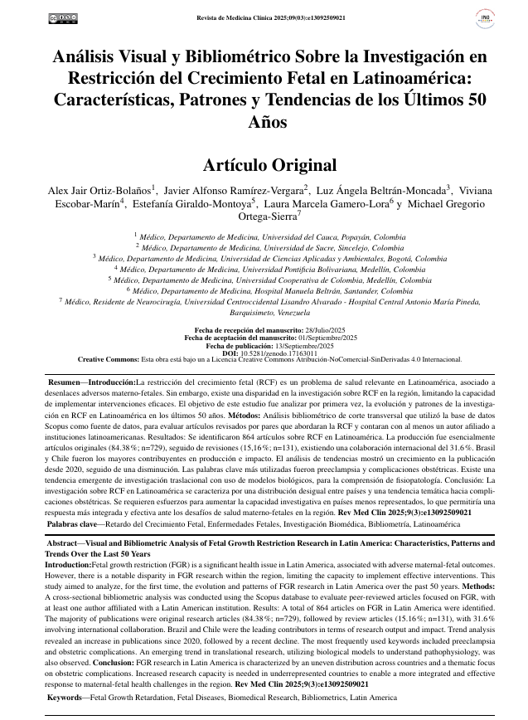Resumen
Introducción: La restricción del crecimiento fetal (RCF) es un problema de salud relevante en Latinoamérica, asociado a desenlaces adversos materno-fetales. Sin embargo, existe una disparidad en la investigación sobre RCF en la región, limitando la capacidad de implementar intervenciones eficaces. El objetivo de este estudio fue analizar por primera vez, la evolución y patrones de la investigación en RCF en Latinoamérica en los últimos 50 años. Métodos: Análisis bibliométrico de corte transversal que utilizó la base de datos Scopus como fuente de datos, para evaluar artículos revisados por pares que abordaran la RCF y contaran con al menos un autor afiliado a instituciones latinoamericanas. Resultados: Se identificaron 864 artículos sobre RCF en Latinoamérica. La producción fue esencialmente artículos originales (84,38%; n=729), seguido de revisiones (15,16%; n=131), existiendo una colaboración internacional del 31,6%. Brasil y Chile fueron los mayores contribuyentes en producción e impacto. El análisis de tendencias mostró un crecimiento en la publicación desde 2020, seguido de una disminución. Las palabras clave más utilizadas fueron preeclampsia y complicaciones obstétricas. Existe una tendencia emergente de investigación traslacional con uso de modelos biológicos, para la comprensión de fisiopatología. Conclusión: La investigación sobre RCF en Latinoamérica se caracteriza por una distribución desigual entre países y una tendencia temática hacia complicaciones obstétricas. Se requieren esfuerzos para aumentar la capacidad investigativa en países menos representados, lo que permitiría una respuesta más integrada y efectiva ante los desafíos de salud materno-fetales en la región.
Referencias
Miranda J, Maestre N, Paternina-Caicedo Á, Parra-Saavedra M, Caradeux J, Sepulveda-Martinez Á, et al. Performance of the INTERGROWTH-21st and World Health Organization fetal growth charts for the detection of small-for-gestational age neonates in Latin America. Int J Gynaecol Obstet. 2023; 161(3):1083-1091.
Colella M, Frérot A, Novais ARB, Baud O. Neonatal and Long-Term Consequences of Fetal Growth Restriction. Curr Pediatr Rev. 2018; 14(4):212-218.
Bendix I, Miller SL, Winterhager E. Editorial: Causes and Consequences of Intrauterine Growth Restriction. Front Endocrinol (Lausanne). 2020; 11:205.
Lee AC, Kozuki N, Cousens S, Stevens GA, Blencowe H, Silveira MF, et al. Estimates of burden and consequences of infants born small for gestational age in low and middle income countries with INTERGROWTH-21st standard: analysis of CHERG datasets. BMJ. 2017; 358:j3677.
Huicho L, Vidal-Cardenas E, Haapaniemi T, Ashorn P; Lima Regional Launch Group. Small vulnerable newborns: the urgent need of strong actions in Peru and the entire Latin America. Lancet Reg Health Am. 2024; 34:100748.
Mangiza M, Ehret DEY, Edwards EM, Rhoda N, Tooke L. Morbidity and mortality in small for gestational age very preterm infants in a middle-income country. Front Pediatr. 2022; 10:915796.
Lozada-Martinez ID, Lozada-Martinez LM, Cabarcas-Martinez A, Ruiz-Gutierrez FK, Aristizabal Vanegas JG, Amorocho Lozada KJ, et al. Historical evolution of cancer genomics research in Latin America: a comprehensive visual and bibliometric analysis until 2023. Front Genet. 2024; 15:1327243.
Lozada-Martinez ID, Visconti-Lopez FJ, Marrugo-Ortiz AC, Ealo-Cardona CI, Camacho-Pérez D, Picón-Jaimes YA. Research and Publication Trends in Pediatric Surgery in Latin America: A Bibliometric and Visual Analysis from 2012 to 2021. J Pediatr Surg. 2023; 58(10):2012-2019.
Aria M, Cuccurullo C. Bibliometrix: An R-Tool for Comprehensive Science Mapping Analysis. J Informetr. 2017;11(4):959-975. doi: 10.1016/j.joi.2017.08.007
Comisión Económica para América Latina y el Caribe. Latin America and the Caribbean Are Behind in Research and Development [Internet]. [Consultado 6 Nov 2024]. Disponible en: https://www.cepal.org/en/comunicados/america-latina-caribe-rezagada-investigacion-desarrollo
Ciocca DR, Delgado G. The reality of scientific research in Latin America; an insider's perspective. Cell Stress Chaperones. 2017; 22(6):847-852.
Mujica OJ, Sanhueza A, Carvajal-Velez L, Vidaletti LP, Costa JC, Barros AJD, et al. Recent trends in maternal and child health inequalities in Latin America and the Caribbean: analysis of repeated national surveys. Int J Equity Health. 2023; 22(1):125.
Cuervo LG, Bermúdez-Tamayo C. Desarrollo de la investigación para la salud en Latinoamérica y el Caribe. Colaboración, publicación y aplicación del conocimiento. Gac Sanit. 2018; 32(3):206-208.
Robinson KA, Brunnhuber K, Ciliska D, Juhl CB, Christensen R, Lund H, et al. Evidence-Based Research Series-Paper 1: What Evidence-Based Research is and why is it important? J Clin Epidemiol. 2021; 129:151-157.
Lozada-Martinez ID, Bolaño-Romero MP, Picón-Jaimes YA, Moscote-Salazar LR, Narvaez-Rojas AR. Quality or quantity? Questions on the growth of global scientific production. Int J Surg. 2022; 105:106862.
Lozada-Martinez ID, Lozada-Martinez LM, Fiorillo-Moreno O. Leiden manifesto and evidence-based research: Are the appropriate standards being used for the correct evaluation of pluralism, gaps and relevance in medical research? J R Coll Physicians Edinb. 2024; 54(1):4-6.
Jennings MC, Pradhan S, Schleiff M, Sacks E, Freeman PA, Gupta S, et al. Comprehensive review of the evidence regarding the effectiveness of community-based primary health care in improving maternal, neonatal and child health: 2. maternal health findings. J Glob Health. 2017; 7(1):010902.
Vargas-Riaño E, Becerril-Montekio V, Becerra-Posada F, Tristán M. Maternal health research outputs and gaps in Latin America: reflections from the mapping study. Global Health. 2017; 13(1):74.
Lozada-Martinez ID, Hernandez-Paez D, Zárate YEJ, Delgado P. Scientometrics and meta-research in medical research: approaches required to ensure scientific rigor in an era of massive low-quality research. Rev Assoc Med Bras (1992). 2025 Jun 6;71(4):e20241612
Ioannidis JPA. Meta-research: Why research on research matters. PLoS Biol. 2018 Mar 13;16(3):e2005468.
Lozada-Martinez ID, Hernandez-Paz DA, Fiorillo-Moreno O, Picón-Jaimes YA, Bermúdez V. Meta-Research in Biomedical Investigation: Gaps and Opportunities Based on Meta-Research Publications and Global Indicators in Health, Science, and Human Development. Publications. 2025; 13(1):7.
Stevens ER, Laynor G. Recognizing the value of meta-research and making it easier to find. J Med Libr Assoc. 2023 Oct 2;111(4):839-843.
Lozada-Martinez ID, Neira-Rodado D, Martinez-Guevara D, Cruz-Soto HS, Sanchez-Echeverry MP, Liscano Y. Why is it important to implement meta-research in universities and institutes with medical research activities? Front Res Metr Anal. 2025 Mar 19;10:1497280.

Esta obra está bajo una licencia internacional Creative Commons Atribución-NoComercial-SinDerivadas 4.0.
Derechos de autor 2025 Alex Jair Ortiz-Bolaños, Javier Alfonso Ramirez-Vergara, Luz Ángela Beltrán-Moncada, Viviana Escobar-Marín, Estefanía Giraldo-Montoya, Laura Marcela Gamero-Lora , Michael Gregorio Ortega-Sierra

